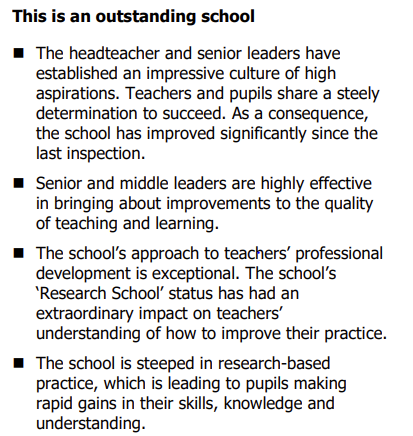There is a lot of publicity about the DfE’s declaration that schools must be open for 32.5 hours a week. Accepting that most schools are already open for longer than 32.5 hours a week, what the DfE need to realise is that the impact of teaching time upon students’ learning depends upon quality not duration.
In 2010 we decided to send our students home an hour early on alternate Mondays, so that we could have two hours every fortnight for staff training, in addition to our five annual training days. This reduced the contact time with students to 24.5 hours a week on average, below the 25 hours recommended by the DfE. When things were really tough I took seven training days a year, but just didn’t tell anyone.
In November 2017 Huntington was graded Outstanding by Ofsted. There was particular praise for our evidence-informed professional development:

Between 2010 and 2018 our students’ results – arguably the most important measure of the impact of our teaching – improved inexorably. In 2018 we had one of those years when every single subject’s results at GCSE and A Level “came in”, and it was that cohort of students who had less, but far better, contact time with their teachers for the duration of their Huntington School careers. To give you a sense of how good the results were, the average GCSE points score (APS) in 2018 was better than the 2021 TAGs equivalent. And for the first time we were awarded an ALPS grade 1 at A Level.
It is the quality of the time spent with teachers that matters most to students’ learning, not the amount of contact time. If the DfE were serious about helping improve the quality of teaching in our schools, they would be wise to acknowledge that ring-fenced time for evidence-informed training of teachers is the secret to improving students’ outcomes, and their policies would reflect that truth.


I’m interested in this approach and naturally feel inclined to agree that quality over quantity is right way forward in terms of teaching time and CPD. When you say that the results ‘came in’ in 2018 what does this look like in terms of outcomes? The Peformance tables show a 0.8 gap for your disadvantaged students and negative progress score of -0.59.
Hi Paul. That is a justified challenge. I think it comes down to the challenge of the curriculum. I have never chased GCSE points. Our policy of GCSE MFL for all (we never made MFL GCSE optional) is key to our challenge – we held by the principle that to be an educated young person you shd study a language and different culture to 16. That ruins your P8 scores, as Dave Thompson has shown repeatedly in his FFT datalab analyses (“At present the more that schools offer MFL the more they are effectively being penalised.” https://ffteducationdatalab.org.uk/2016/02/which-are-the-most-difficult-subjects-at-gcse/. The attainment of students was pretty high across the board and at A level we attained a grade 1 on ALPS, as well as En & Ma 5+ rising by 12% in the first year of the new spec GCSEs, when City of York average fell by 1%. I think Amanda Spielman’s speech to the ASE two months after our 2017 inspection supports my claim that it is the challenge of the curriculum rather than chasing GCSE points that really matters: “But we should acknowledge that it will require strong leadership and management and a courage within senior teams to do what is in the best interests of children. And I know this may feel in tension with league table goals. I was very pleased to read the Ofsted report on Huntington School in York, which had a curriculum designed to fit with pupils’ needs and aspirations regardless of performance measures.” https://www.gov.uk/government/speeches/amanda-spielmans-speech-at-the-association-for-science-education-annual-conference-2018 Hope that helps. Always open to challenge!